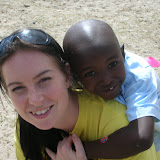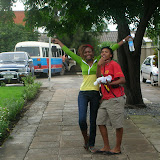Dani and her husband Mike are both incredibly generous with their time and their hearts. Both are from the States but Dani has been here for 5 years. Mike is a newly trained doctor who arrived around the same time as I did and is now volunteering his time and energy wherever it is needed.
I thought it would be nice to hear a different story....

There are corners of the world I live in that never cease to break my heart. These are dark corners that oftentimes, I'd rather just walk by. Because if I walk in, I meet people whose lives make me hurt. Yet somehow their lives are also a breath of fresh hope that motivates me to go back.
This is my report on the state of one such corner somewhere. On the state of a small corner room in a large orphanage called the Ark. On the state of the world according to a few girls who have experienced more of the worst of it in their youths than I've personally experienced in my life time. I'm there at the ark twice a week. I've gotten used to the ark for five years. Ok, maybe that's not right. I've been to the Ark for five years but I've never gotten used to it.
The drive to the Ark is often a heavy one. We leave the office to hit the highway and rows of houses soon to into mounds of shacks. Emerging from the mounds of shacks, we see children running around unsupervised next to the highway, goats and cows wandering dangerously close to the yellow lines, and sometimes heavy black smoke if the shacks have caught on fire again. In the midst of this, we take an exit, and drive past rows of concrete tubing that people find shelter in, take a right turn, and start down the driveway of the Ark "City of Refuge". Along the drive way, kids wave already and teenagers sit listlessly on concrete blocks scratching with sticks in the dirt. We take a deep breath as we enter the gate, because before we even park the car has been swarmed. By children. Trying to direct the car into a spot as if we were at a crowded concert and not the only car in the lot. They pull on the door handles trying to help us out of the car as if we were celebrities. Reaching their hands inside the half open windows, to wave, to touch, to ask for that sweet left in the ash tray. They shout our names and come running across the field as if our simple acknowledgement of their existence was their most desperate need of the day. We open the car door and step out into an avalanche of hugs, of hands reaching, grabbing, needing to be loved. Needing to be spoken to. Needing to be smiled at. I am drained before I even leave the parking lot.
Somehow I manage to navigate the Velcro children and make my way back to the "Youth Girls" section, where at the moment 6 girls without mom's and dad's from the ages of 6-18 are living with a house mother who is 25. This week there were five girls. Lebu, a 6 year old light bulb, had been taken away by her step mother to attend her father's funeral. Her father is the only living relative left in her life. Her father was the only one left who loved her. He took her out of the Ark on the holidays. Now she will be a certified orphan- her stepmother hates her and will be glad to leave her at the Ark full time now. Trying out different hair styles in the dusty mirror in the corner, are the 13-year old twins from Congo, Prisill and Perci. They arrived 8 months ago when their father was killed in the Democratic Republic of Congo. They could not speak English and failed grade 8 and now are trying again. We sat on the floor this week and talked about HIV/AIDS and goals in life. They both said they wanted to go to University. I asked them what they wanted to study. Perci immediately replied "Reading!" What do you mean I asked. You want to teach people how to read? No she said. I want to learn how to read. You don't know how to read English? I assumed. No, I don't know how to read she said. Not French, not English, not Afrikaans. I asked her sister, Prisill, And you? Nope, not at all. Looks like soccer is going to have to take a backseat to reading lessons for the next few months. I think maybe we need to teach them how to read before we help them apply for university....
Sitting to the right of the twins and constantly trying to get a word in edgewise is Nandhipa, an 11 year old, who pulled me aside last week to quietly ask me when she will be coming to my house for a weekend. She also asked me if I could take her to get tested for HIV. I don't know what to do, because what will I do if she is positive, how do I help an 11 year old deal with that, while teaching two 13 year olds how to read and a 6 year old grieve the death of her father. I tell her that I'll think about it, knowing we will have to make sure a support system is in place for her first. Don't even ask me why she thinks she might need to get tested. I can't bare to tell you about what she's already been through.
Moving onto to Nandhipa's right, is Lindo, full name Nomlindo, a 7 year old with a heart of gold. I know that's cliché but there's no other way to say it. She is bored with our discussion about HIV/AIDS and life goals and so she wanders off and then comes back, and rests against my lap. Perci asks me where I was born. I say America. She asks me to tell her about America and I tell her it is cold there right now! I ask her where she was born even though I know, I think it is good to talk about our roots. Perci was born in Congo she says proudly. And you Prisill? She laughs at me, but proudly replies, Congo! Before I can ask Nandhipa is anxious to shout out, "And me! I was born in Durban! (A city on the East Coast of South Africa)." So she doesn't feel left out we turn to Lindo, "Where were you born Lindo?" She doesn't know and shakes her head and looks embarrassed. The twins start to laugh, how could you not know where you are born? I quickly shush them and tell Lindo that it's ok. I met her mother 3 years ago, when she was dying in the Ark clinic of AIDS. I'm pretty sure Lindo was born in South Africa, maybe even Cape Town. I squeeze her tightly and turn the conversation else where because I know she is also thinking of her mother.
Meanwhile, 16 year old Sylvia walks in from school. She attends school outside the Ark because the Ark doesn't have a high school. She is not doing well in school. Sylvia is very clever but she came from Congo 2 years ago, and English and Afrikaans is still a struggle for her. She asks me to help her with a project for her "Tourism" class. Sylvia wrote out her life story for me on five pages last week, we are going to use it both to help her work on her English (by editing it together) and work it into something she can share with others (you'll probably get it in an email) to help herself and others find healing and strength.
Somehow, though I should leave this corner room feeling heavy and drained, it always seems I leave this corner encouraged. Lightened by the the thankfulness that God has put these young women in my life. Yes a bit because it gives me people to help, but mostly because it puts me in awe of their own resilience and strength. And though some may wonder where God was when they went through these things, if you look in their eyes, you don't wonder where God is now, you see Him right there, right now, in those eyes. I'm not sure what we can do for these girls. I love each of them. They make my corner of the world brighter. I'm not sure how or what our little investments in their lives can do to impact them, but I know they deserve it. I know they deserve all my effort and energy to try to make their worlds a little brighter and remind them that though the world may have forgotten them in this little corner, of this little orphanage, in the little country of South Africa, God has not. Please say a prayer for each of them this week if you think of it. And in the dark corners of the world you live in, be that breath of fresh hope to the forgotten ones there, see God in their eyes, and be his messenger, his reminder, his megaphone of love.
In Christ,
Danielle Davidson
HIV/AIDS Program Coordinator
Ambassadors in Sport






